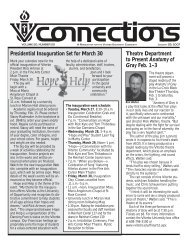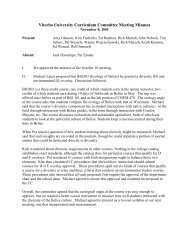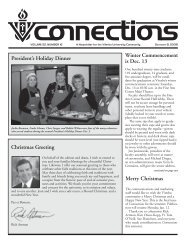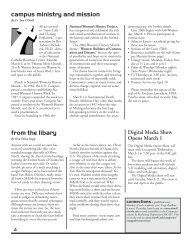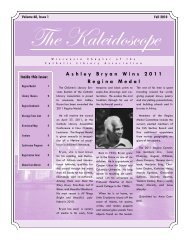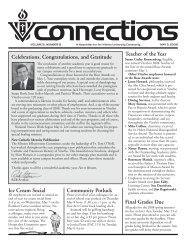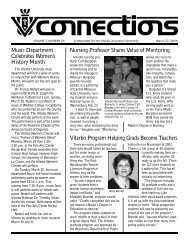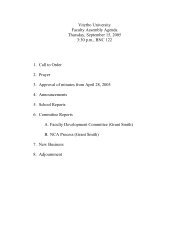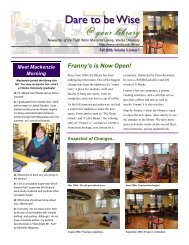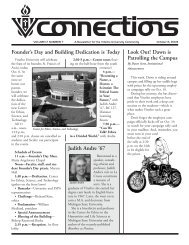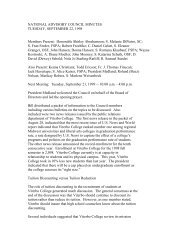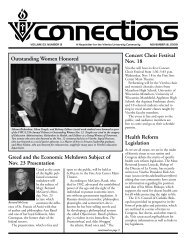2003-2004 - Past and Present
2003-2004 - Past and Present
2003-2004 - Past and Present
You also want an ePaper? Increase the reach of your titles
YUMPU automatically turns print PDFs into web optimized ePapers that Google loves.
Drug & Alcohol Awareness Committee: October 2 , <strong>2003</strong> Minutes<br />
<strong>Present</strong>: Jonathan Hinck, Jade Bakke, Loretta Waughtal, Anne Ellefson<br />
Agenda Item 1: Connect Club Update<br />
Ellefson reported nine new peer educators were trained. Members continue to<br />
man the Thursday night coffeehouse <strong>and</strong> delivering classroom presentations.<br />
Committees are working on Trick or Treat for Place of Grace <strong>and</strong> movie nights on<br />
campus.<br />
Agenda Item 2: About the Committee <strong>and</strong> Prevention<br />
General information about the past committee topics/roles was shared. Largely,<br />
committee members have functioned to help gather information in needs assessment, to<br />
share alcohol/drug prevention information with the larger campus community, <strong>and</strong> to<br />
assist with prevention activities, such as revising policies. In addition, the biennial<br />
review needs to be completed in the spring of <strong>2004</strong>. The federal government requires<br />
that colleges conduct basic program evaluation activities every two years.<br />
Ellefson outlined general information about prevention. Basically, prevention<br />
goals are to create/strengthen environments that promote healthy lifestyles <strong>and</strong> to assist<br />
individuals in developing the skills, underst<strong>and</strong>ings, <strong>and</strong> support systems that are<br />
associated with health <strong>and</strong> well being. The Center for Substance Abuse Prevention<br />
suggests the following strategies for prevention: information, education, alternatives,<br />
environmental (i.e., policies, ads, norms, availability), community mobilization, <strong>and</strong> early<br />
problem identification/referral. These are the strategies the committee will likely focus<br />
on throughout the year.<br />
Agenda Item 3: Surveys<br />
Survey results of the April <strong>2003</strong> survey were shared. Viterbo mirrors national<br />
stats related to collegiate drinking issues. We are probably a bit lower than many<br />
Wisconsin universities, as Wisconsin stats tend to be higher than the national norms. In<br />
addition, small private schools tend to have lower usage rates than their larger<br />
counterparts. The responses of 18 & 19-year-old males on the April survey were also<br />
shared. This population reported much higher usage rates—in many cases twice as high<br />
as the overall college rates. Also, the results of a brief survey that 280 traditional-aged,<br />
first-year students completed during orientation were also shared. In the alcohol/drug<br />
related areas of the survey, the majority (69%) reported they had consumed alcohol with<br />
friends prior to attending college, while 19% reported using marijuana <strong>and</strong> 20% reported<br />
smoking cigarettes prior to coming to Viterbo. Also, 48% indicated they believed people<br />
expect college students to drink <strong>and</strong> party a lot, <strong>and</strong> 84% indicated they preferred to date<br />
a non-smoker.<br />
Agenda Item 4: Other<br />
• There were more campus alcohol-related disruptions on Octoberfest weekend<br />
than has been the case in recent years. Additional strategies for that weekend may<br />
need to be planned <strong>and</strong> publicized next year.
• Ellefson shared a September <strong>2003</strong> report related to national strategies for<br />
preventing underage drinking. The recommendations are largely environmental<br />
strategies—keg registration, increased taxation on alcohol, etc.<br />
The next meeting is Thursday, November 13, at 3:00 p.m. at the SDC.
DRUG AND ALCOHOL COMMITTEE MEETING<br />
NOVEMBER 13, <strong>2003</strong><br />
<strong>Present</strong>: Lori Lewis, Jade Bakke, Adrienne Appler, Loretta Waughtal, Abbie<br />
Polzin, Tanika Skeen, Anne Ellefson<br />
Agenda Item 1: Connect Update<br />
Connect currently has 21 members <strong>and</strong> will be recruiting again in January. Activities<br />
conducted this semester include movie nights, several presentations, Thursday night<br />
coffeehouses, <strong>and</strong> public awareness campaigns focusing on social norms, stress, nicotine,<br />
<strong>and</strong> campus services. The Club also completed two service projects: Trick or Treat for<br />
Place of Grace <strong>and</strong> a game at the Safe Trick or Treat Night. Initial planning for Alcohol<br />
Awareness Week is being done.<br />
Agenda Item 2: Program Goals<br />
Ellefson shared information about campus goals related to alcohol/drugs issues. The<br />
goals address environmental issues involved in creating an environment where abstinence<br />
is an accepted/respected choice, where low-risk drinking is perceived <strong>and</strong> practiced as the<br />
norm by those who chose to drink, <strong>and</strong> where the majority of students recognize <strong>and</strong><br />
know how to help a peer making a high-risk choice.<br />
Agenda Item 3: SAB INFO<br />
Alternative activities are one of the recognized prevention strategies, <strong>and</strong> SAB is the key<br />
group on campus coordinating such activities. Adrienne Appler, SAB Advisor, reported<br />
that SAB has over thirty members <strong>and</strong> has been active this year. The group sponsored<br />
several events during the first weeks of school, a time when it is especially important for<br />
first-year students. Currently, the plans are to have homecoming be an alcohol-free event<br />
this year. SAB is working on becoming a club, rather than a subcommittee of SGA.<br />
Pictures from the SAB Halloween events were shared with the committee; Halloween is a<br />
holiday that has been problematic on many campuses <strong>and</strong> college communities recently.<br />
Agenda Item 4: Info—College Athletes <strong>and</strong> AOD Issues<br />
Ellefson distributed information about collegiate athletes <strong>and</strong> alcohol issues. Athletes<br />
are generally one of the subgroups targeted in comprehensive collegiate AODA<br />
prevention programs. In general, athletes drink at higher rates <strong>and</strong> experience more<br />
negative AOD consequences than do their non-athlete peers. Several recommendations<br />
for prevention strategies for collegiate athletic programs from the Higher Education<br />
Center were reviewed. Information was shared about the current process for dealing with<br />
athletic issues at Viterbo.<br />
Other:<br />
• Jade reported that things seem to be going well on the “healthy-living” floor.<br />
• The group discussed alcohol-related v<strong>and</strong>alism on campuses.<br />
Next Meeting: Thursday, January 29, <strong>2003</strong>
Drug <strong>and</strong> Alcohol Awareness Committee Minutes<br />
January 29, <strong>2004</strong><br />
<strong>Present</strong>: Lori Lewis, Loretta Waughtal, Jon Hinck, Cindy Kothbauer, Tanika Skeen,<br />
Abbie Polzin, Anne Ellefson<br />
Agenda Item 1: Connect Update:<br />
Abbie Polzin, Connect Club president, reported Connect continues to sponsor movie<br />
nights <strong>and</strong> do presentations. Four new members were recruited this semester. Members<br />
will be serving on various committees for Alcohol Awareness Week this semester.<br />
Agenda Item 2: Alcohol Awareness Week Update:<br />
Tanika Skeen, Alcohol Awareness Week coordinator, described the goals <strong>and</strong> timetables<br />
established for Alcohol Awareness Week. Basic goals are to have at least fourteen other<br />
organizations coordinate activities, have Connect sponsor three activities, involve at least<br />
400 students in programs, <strong>and</strong> conduct the annual survey.<br />
Agenda Item 3: Public Awareness Campaign<br />
A new public awareness campaign, focusing on low-risk drinking guides, will be<br />
displayed next week.<br />
Agenda Item 4: Biennial Review<br />
Ellefson distributed materials describing the Biennial Review process. This is an<br />
evaluation of AODA programming that the University is required to complete every two<br />
years. The stated purposes of the process are 1) to determine the effectiveness of, <strong>and</strong> to<br />
implement any needed changes to, the AOD program; <strong>and</strong> 2) to ensure that the<br />
disciplinary sanctions for violating st<strong>and</strong>ards of conduct are enforced consistently.<br />
Recommended contents of the review include a description of AOD program, goal<br />
statements <strong>and</strong> statements related to achievement of goals, assessment of strengths <strong>and</strong><br />
weaknesses, outline of policy distribution procedures, copies of policies, <strong>and</strong><br />
recommendations for program revisions.<br />
Members were asked to review the materials, to think about their personal opinions of the<br />
strengths <strong>and</strong> weaknesses of campus programming, <strong>and</strong> to figure out what information or<br />
materials they would need to do a reasonably sound evaluation of programming. Jason<br />
Ramaker <strong>and</strong> Barry Fried will be asked to attend the next meeting to discuss policy<br />
enforcement issues.<br />
Next Meeting:<br />
Anne will send forms to John Nebeck <strong>and</strong> Lori Lewis to determine their second semester<br />
schedules <strong>and</strong> try to find a time when all committee members are available. An email<br />
will be sent with that information. Plans are to meet at the end of February.
Drug <strong>and</strong> Alcohol Committee Meeting<br />
February 25, <strong>2004</strong><br />
<strong>Present</strong>: Lori Lewis, Loretta Waughtal, Jon Hinck, Cindy Kothbauer, Teri Kunavich,<br />
Anne Ellefson<br />
Guest: Ed Rodenkirch<br />
Agenda Item 1: Connect Update<br />
The peer educators’ primary focus is on planning for Alcohol Awareness Week,<br />
scheduled for April 18-23. Five Connect committees have been established to work on<br />
the week. Thus far, six campus groups have registered activities for the week, <strong>and</strong><br />
Connect plans to sponsor three activities. The deadline to submit activities is March 29.<br />
The goal is to have at least 14 campus groups sponsor activities during the week. Other<br />
Connect activities include presentations about stress management, movie nights, <strong>and</strong><br />
publicity about available recreational activities.<br />
Agenda Item 2: Homecoming Update<br />
Ed Rodenkirch, SAB member, reported on the Homecoming Dance. This was the first<br />
year SAB decided not to serve alcohol at the dance. Ed indicated things went well, with<br />
approximately 75% of the people at the dance rating the event an 8-10 on a ten-point<br />
evaluation form. Nearly four hundred students attended the event. Ed indicated there<br />
were significantly fewer planning headaches for SAB members <strong>and</strong> only one alcoholrelated<br />
incident, involving an individual who was not a Viterbo student. Although there<br />
were a few student complaints, most were made by students who had attended in the past;<br />
historically, most freshmen have expressed surprise that alcohol was served at the<br />
homecoming event anyway. Ed indicated it was likely that SAB would choose to<br />
organize the event without alcohol again next year, establishing a new norm. It was<br />
noted that, given the turnover of the collegiate population, the first two years would<br />
predictably be the years when there would be student complaints about non-service.<br />
Agenda Item 3: Biennial Review<br />
The six items the committee will be responsible for reviewing to complete the Biennial<br />
Review were reviewed. Information about program goals <strong>and</strong> activities, the first two<br />
goals, was distributed. There was a consensus that these two sections would remain very<br />
similar to the 2002 review.<br />
The committee then brainstormed the following list of program strengths <strong>and</strong><br />
weaknesses:<br />
1. Strengths:<br />
a. Existence of a full-time position to deal with AODA issues.<br />
b. The significant improvements in coffeehouse activities in the last two<br />
years.<br />
c. Student led peer education programming.<br />
d. Student-driven movements to increase fines for alcohol violations <strong>and</strong><br />
discontinue alcohol service at homecoming.
e. Establishing the norm of no alcohol service for the homecoming dance.<br />
f. Expansion of curriculum infusion with the chemical dependency<br />
certification program in the Psychology Department.<br />
g. Visibility of prevention flyers <strong>and</strong> table tents.<br />
h. Improvements in CREW & intramurals, giving students another option for<br />
alternative recreational events<br />
i. Existence of a healthy living floor.<br />
2. Weaknesses:<br />
a. Lost the forum for part of the alcohol education targeting freshmen with<br />
the discontinuance of PCC<br />
b. Need for additional counseling services<br />
c. Need for more educational strategies targeting faculty <strong>and</strong> staff<br />
d. Need for policy related to issues involved in over-night recruitment visits<br />
by high school students<br />
e. Need for consistent validated <strong>and</strong> st<strong>and</strong>ardized evaluation<br />
f. Need to ensure policies are distributed to all graduate students<br />
g. Difficulty impacting the minority of students (20%ish) making very highrisk<br />
alcohol choices.<br />
These lists will be exp<strong>and</strong>ed <strong>and</strong> revised at the next meeting.<br />
Agenda Item 4: Info Needed to Complete the Biennial Review<br />
The following people will be invited to attend the next meeting to share the following<br />
info:<br />
1. Barry Fried <strong>and</strong> Paul Sannerud: Info related to overnight recruitment visits<br />
2. Jason Ramaker: Info about # of violations, enforcement issues, online program,<br />
Healthy Living Floor, <strong>and</strong> Mugshots<br />
Next Meeting: Wednesday, March 24, 1:00 p.m. at the SDC
Drug <strong>and</strong> Alcohol Committee Meeting<br />
April 21, <strong>2004</strong><br />
<strong>Present</strong>: Lori Lewis, Cindy Kothbauer, Teri Kunavich, Jade Bakke, Jason Ramaker,<br />
Anne Ellefson<br />
Agenda Item 1: Edgewood Workshop<br />
Loretta Waughtal, Anne Ellefson, Adrienne Appler, <strong>and</strong> some students attended the<br />
Edgewood workshop about collegiate AODA programming. The workshop was<br />
conducted by the Higher Education Center <strong>and</strong> provided updates on recommendations for<br />
campus AODA strategies. Recommendations included offering alternatives, creating<br />
environment with health-promoting norms, limiting alcohol availability on <strong>and</strong> off<br />
campus, restricting marketing/promotion on <strong>and</strong> off campus, <strong>and</strong> developing/enforcing<br />
campus policies. A significant emphasis was placed on community issues. Specific<br />
strategies in each category were outlined. The committee will examine each category in<br />
detail next year.<br />
Agenda Item 2: Updates on Alcohol Awareness Week <strong>and</strong> Connect<br />
Connect has been focused primarily on Alcohol Awareness Week, scheduled for this<br />
week. Thus far, events have gone fine, <strong>and</strong> attendance has been good. The schedule<br />
includes a variety of awareness, educational, <strong>and</strong> recreational events. Fifteen campus<br />
groups sponsored events for the week. In addition, the Core Survey is being conducted<br />
via email this week. Other Connect activities this month include a movie night, Thursday<br />
night coffeehouse, meetings, <strong>and</strong> a picnic scheduled for April 28.<br />
Agenda Item 3: Biennial Review<br />
Members reviewed a draft of the Biennial Review. Jason Ramaker shared information<br />
needed to report on enforcement issues <strong>and</strong> the status of the Healthy Living Floor.<br />
Suggestions included adding a comment about house parties to the weakness section <strong>and</strong><br />
adding a recommendation related to improving communication/collaboration with local<br />
police department. Ellefson will revise report <strong>and</strong> add information.<br />
Agenda Item 4: Other<br />
Discussion took place about the likelihood that there will be no alcohol service at<br />
Courtyard Carni, as no group submitted a bid for the service. It was noted that it was<br />
important that the reason for the absence of the beer tent be consistently stressed with<br />
students.<br />
Thanks for your service on the committee this year.



